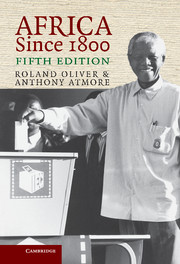Book contents
- Frontmatter
- Contents
- List of Maps
- ONE AFRICA NORTH OF THE EQUATOR
- TWO AFRICA SOUTH OF THE EQUATOR
- THREE THE OPENING UP OF AFRICA: (1) FROM THE NORTH-EAST
- FOUR THE OPENING UP OF AFRICA: (2) FROM THE MAGHRIB
- FIVE WEST AFRICA BEFORE THE COLONIAL PERIOD, 1800–1875
- SIX WESTERN CENTRAL AFRICA, 1800–1880
- SEVEN EASTERN CENTRAL AFRICA, 1800–1884
- EIGHT SOUTHERN AFRICA, 1800–1885
- NINE THE PARTITION OF AFRICA ON PAPER, 1879–1891
- TEN THE PARTITION OF AFRICA ON THE GROUND, 1891–1901
- ELEVEN COLONIAL RULE IN TROPICAL AFRICA: (1) POLITICAL AND ECONOMIC DEVELOPMENTS, 1885–1914
- TWELVE COLONIAL RULE IN TROPICAL AFRICA: (2) SOCIAL AND RELIGIOUS DEVELOPMENTS
- THIRTEEN THE INTER-WAR PERIOD, 1918–1938
- FOURTEEN NORTH AND NORTH-EAST AFRICA, 1900–1939
- FIFTEEN SOUTH AFRICA, 1902–1939
- SIXTEEN THE LAST YEARS OF COLONIAL RULE
- SEVENTEEN THE ROAD TO INDEPENDENCE: (1) NORTH AND NORTH-EAST AFRICA
- EIGHTEEN THE ROAD TO INDEPENDENCE: (2) AFRICA FROM THE SAHARA TO THE ZAMBEZI
- NINETEEN THE ROAD TO INDEPENDENCE: (3) CENTRAL AFRICA
- TWENTY THE LONG ROAD TO DEMOCRACY IN SOUTHERN AFRICA
- TWENTY ONE THE POLITICS OF INDEPENDENT AFRICA
- TWENTY TWO ECONOMICS AND SOCIETY IN INDEPENDENT AFRICA
- TWENTY THREE INTO THE THIRD MILLENNIUM
- EPILOGUE
- Suggestions for Further Reading
- Index
TWENTY - THE LONG ROAD TO DEMOCRACY IN SOUTHERN AFRICA
Published online by Cambridge University Press: 05 June 2012
- Frontmatter
- Contents
- List of Maps
- ONE AFRICA NORTH OF THE EQUATOR
- TWO AFRICA SOUTH OF THE EQUATOR
- THREE THE OPENING UP OF AFRICA: (1) FROM THE NORTH-EAST
- FOUR THE OPENING UP OF AFRICA: (2) FROM THE MAGHRIB
- FIVE WEST AFRICA BEFORE THE COLONIAL PERIOD, 1800–1875
- SIX WESTERN CENTRAL AFRICA, 1800–1880
- SEVEN EASTERN CENTRAL AFRICA, 1800–1884
- EIGHT SOUTHERN AFRICA, 1800–1885
- NINE THE PARTITION OF AFRICA ON PAPER, 1879–1891
- TEN THE PARTITION OF AFRICA ON THE GROUND, 1891–1901
- ELEVEN COLONIAL RULE IN TROPICAL AFRICA: (1) POLITICAL AND ECONOMIC DEVELOPMENTS, 1885–1914
- TWELVE COLONIAL RULE IN TROPICAL AFRICA: (2) SOCIAL AND RELIGIOUS DEVELOPMENTS
- THIRTEEN THE INTER-WAR PERIOD, 1918–1938
- FOURTEEN NORTH AND NORTH-EAST AFRICA, 1900–1939
- FIFTEEN SOUTH AFRICA, 1902–1939
- SIXTEEN THE LAST YEARS OF COLONIAL RULE
- SEVENTEEN THE ROAD TO INDEPENDENCE: (1) NORTH AND NORTH-EAST AFRICA
- EIGHTEEN THE ROAD TO INDEPENDENCE: (2) AFRICA FROM THE SAHARA TO THE ZAMBEZI
- NINETEEN THE ROAD TO INDEPENDENCE: (3) CENTRAL AFRICA
- TWENTY THE LONG ROAD TO DEMOCRACY IN SOUTHERN AFRICA
- TWENTY ONE THE POLITICS OF INDEPENDENT AFRICA
- TWENTY TWO ECONOMICS AND SOCIETY IN INDEPENDENT AFRICA
- TWENTY THREE INTO THE THIRD MILLENNIUM
- EPILOGUE
- Suggestions for Further Reading
- Index
Summary
During the years between 1945 and 1980, while the rest of Africa was making the transition from colonial rule to independence under African governments, the principal country of southern Africa was moving firmly in the opposite direction. The reason was not that the 9 million or so Africans who lived there were any slower in developing political consciousness than those living in countries farther north. To the contrary, missionary education in South Africa went back to the middle of the nineteenth century, and by the middle of the twentieth, there were black professors, black doctors, black clergy, black journalists, and a host of other professional people who were at least as able as their contemporaries in other African countries to see the significance of the United Nations Charter and the coming withdrawal of the British from India. Black South African delegates had attended the Fifth Pan–African Congress in Manchester in 1945 and were in touch with the emerging political leaders of tropical Africa like Nkrumah and Kenyatta. By December 1945, the African National Congress (ANC) of South Africa had formally and publicly demanded one-man/one-vote and freedom of movement, residence, and land-ownership. Its officials were already lobbying at the United Nations, and even presenting petitions from the Africans of South West Africa asking for a UN trusteeship to replace the League of Nations Mandate.
What made the difference in South Africa was the existence of a white community of some 4 million, by far the largest and longest established in the whole continent, which had long controlled the whole civil and military apparatus of the state and was independent of any outside power.
- Type
- Chapter
- Information
- Africa since 1800 , pp. 283 - 302Publisher: Cambridge University PressPrint publication year: 2005



